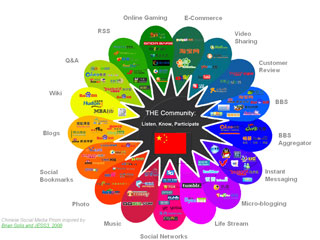 Most of us believe that the Chinese cannot use social media to its fullest potential because of its government’s restrictive internet policies. But according to the panelists of “Social Media and China: Different Than You Think,” this the furthest thing from the truth.
Most of us believe that the Chinese cannot use social media to its fullest potential because of its government’s restrictive internet policies. But according to the panelists of “Social Media and China: Different Than You Think,” this the furthest thing from the truth.
Sam Flemming (of CIC) reminded the audience that China has an even bigger internet population than the US.
“Despite what you think, everything that is happening in the West with social media, is also happening in the East with China and its happening on steroids,” he said.
Here are the numbers: 221 million people are on blogs. 117 million are on BBS – an anonymous community sharing program. 176 million are on social networking sites.
Flemming said that social media and the internet remains the biggest influence of Chinese popular culture. The Chinese are using social networking sites like Tencent, Qzone, RenRen, Kaixin001, 51.com as part of their daily lives. Each of these sites has millions of active users, and many Chinese- like Westerners- have multiple accounts.
All panelists stressed that they believe that the Chinese are better innovators of online content and products. They tend to be active users who love instant messaging tools, online videos, online shopping , online gaming, and downloading music.
The Chinese also love to trade information, especially about things that they want to buy online – particularly automobiles. This is especially interesting considering that most Chinese cannot afford a car.
They also have created some of the most popular video games. Benjamin Joffe (Plus Eight Star) explained that the first version of the popular internet game Farmville was actually made in China by the company 5 Minutes.
To view some more of Joffe’s presentations click here.


Permalink
It’s neat to find out that the majority of Westerners have the wrong idea about social media in China. It’s also very motivating to think that even though China’s government has restrictive internet policies, the people there are still blogging, messaging, involved in social media and creating new programs and games even more than in the U.S.
Isn’t it funny, that even with all our freedom’s we are still behind other countries?
Permalink
In response to the first comment, I do find it funny how the United States is a bit behind in the use of social media (and online content in general) when compared to China and other eastern nations despite the more freedoms Americans possess.
As the country with the largest population in the world, I’m glad that China has been advancing in regard to the Internet and its many resources. Who else believes that the Chinese government’s restrictive online policies will become more lax in the next 10 years?
Permalink
This is interesting to know that the Internet population of China seems to be more adept than ours in the United States. I am not surprised they have more users simply because they have an overwhelmingly larger population than ours. But, everything I have read before hearing from this panel has suggested even with all the blogging and social media platforms available to China, the United States has better been able to manifest the use of these online tools for business and networking purposes. Interesting to hear quite the opposite.
I wonder what kind of restrictions they have in place with all these blogging and social media sites? How China handled the whole Google situation does not make me optimistic of Internet freedoms in China’s near future. I do believe though that if China wants to fully assert itself as more of a global Web 2.0 power, they will need more cooperation and less government restrictions. Old habits do die hard.
Permalink
I’m surprised that it was found necessary to inform people that they use social media in China. Of course they do, just because they are censored, doesn’t mean they don’t have it at all. Think about it, quite often, comedic films have plenty of cuss words and material inappropriate for children, however, they are put on television, with censors.
Obviously, this is not the same situation, but its jsut a comparison. Basically, what I’m saying is that you can censor things without doing away with them completely. I’m glad that they have so much social media, it’s should be interesting to see what develops.
Permalink
It definitely changed some of the stereotypes I had heard about China. I’ve read several different articles about specific content being restricted by the Chinese government or about specific artists being banned as well. It was interesting to hear the other side of the argument and how involved the country is in expanding social medias.